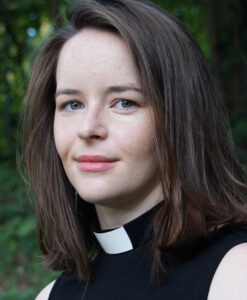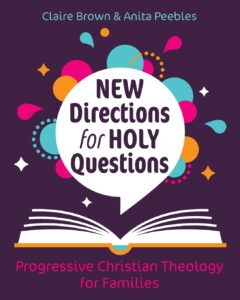A book initially conceived to nurture the religious curiosity of children came to add assurances for adults nervous about giving wrong answers or feeling they should be much more theologically proficient when talking with children.
“So many grown-ups feel like they should be the knowledgeable ones and that they should have all the answers as a security for their children. But we try to tell them it really is OK to say, ‘I don’t know. Let’s find out together,” said Anita Peebles, co-author of New Directions for Holy Questions: Progressive Theology for Families.
In fact, the book offers more questions than it does answers for children and adults because the process of spiritual and theological inquiry itself inspires deep reflection, said Peebles, associate pastor for next-generation ministries at Seattle First Baptist Church in Washington.

Anita Peebles
“A lot of times people think asking questions means you are doubting your faith or that your faith is not strong, but that’s not true. It actually means you’re taking your faith seriously and you are loving God with your mind with some of these big God questions,” she said.
Parents shouldn’t worry when they or their children are asking hard-to-answer questions about topics such as Scripture, theology or the church, she advises. “We hope people understand that asking questions about your faith is OK and that asking questions about God and the Bible is OK. And you are not alone in asking those questions.”
Peebles and co-author Claire Brown, an author and Episcopal priest serving in Athens, Tenn., push the question motif in multiple ways in New Directions. Each of the book’s 19 chapters are titled and begin with questions on topics ranging from Jesus, the Holy Spirit, baptism, worship, sin, forgiveness and what happens to people when they die.

Claire Brown
“What do you imagine when you think of God?” Chapter 2 asks. “What does God look like? Sound like? What names do you call God?”
The answers have varied through different ages and contexts and experiences of God, the text explains. “Some think of God as a parent; others think of God as a judge. Some believe God is mysterious and hard to describe; others think God as being very clearly understood.”
Each chapter also includes spiritual practices, further questions for reflection and stories from everyday life designed to inspire concern around issues such as gender and LGBTQ equality, anti-racism, creation care, and social and economic justice, among others.
“These stories tell how individuals and groups have worked to make the world more generous, loving and safe for all people,” according to the introduction written for children.
The book also contains a separate introduction to help adults more comfortably and effectively participate in discussing faith matters with children. It asks: “Why does it feel so difficult to have these conversations? How do we ponder big, holy questions with kids in a way that helps us all grow?”
The book promises not to deliver templates or stock answers to those questions; instead, it assures parents they are not alone in feeling challenged when children start pondering weighty theological matters.
“Parents and professional practitioners who care about sharing the Christian faith with their kids can run into all sorts of sticky sports and weird ideas as we explore the big questions,” the authors admit.
“Parents and professional practitioners who care about sharing the Christian faith with their kids can run into all sorts of sticky sports and weird ideas as we explore the big questions.”
One approach to relating with children in those moments is to “let the learners lead,” Peebles said. “It means just being present with the children in your life and letting the conversations go where their questions take you. You can follow in their wonderings and in their questions, and you can sense when they are curious about something or when there is an unsatisfying answer provided to them.”
Often the hardest questions come after the death of a grandparent or a family pet, Peebles said. “We really believe in having open and authentic relationships with children and supporting them. And when children are comfortable, they will ask you questions, and they will trust you enough to invite you into their wonderings.”
 Yet parents often need permission to ask those questions, too, Peebles added. “Trying to reconcile these issues can feel very lonely” for parents who don’t know the answers or who fear asking questions may confuse their children or offend their faith community.
Yet parents often need permission to ask those questions, too, Peebles added. “Trying to reconcile these issues can feel very lonely” for parents who don’t know the answers or who fear asking questions may confuse their children or offend their faith community.
“People do sometimes feel lonely in wondering if they are going to be estranged from a more conservative church and if there will be anyone out there to engage them in their walk of faith,” she said.
But communities are popping up around the New Directions in unforeseen ways, some guided by the online resources, including a podcast, associated with the book. Peebles said she has learned of at least one youth group and one hospice unit for seniors using the text.
“The intention was for it to be a children’s faith formation book with a side of adult faith formation. But it’s become clear to us that it’s already speaking to people in ways we never imaged.”
Related articles:
Pew study offers some surprising insights to American views on suffering, salvation, heaven and hell
What if God is bigger than ‘omnipotent’? | Opinion by Russ Dean
52 questions Jesus is still asking | Opinion by Jayne Davis


